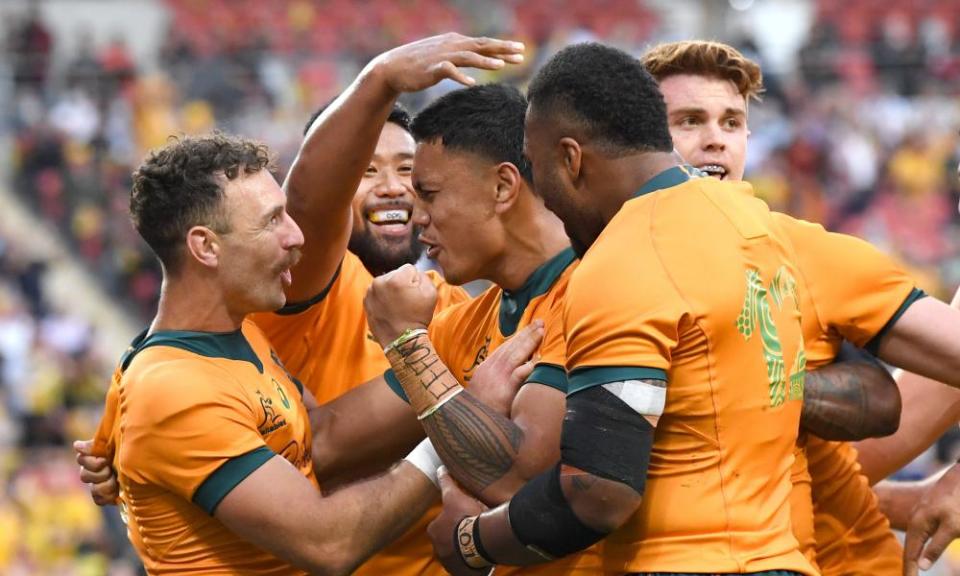Wallabies can dare to dream two years out from next World Cup

More people saw Covid-19 coming than back-to-back wins against South Africa. After a 3-0 clean sweep by the All Blacks in the Bledisloe Cup series, the Wallabies looked as if they would be no match for the world champion Springboks.
But while Australia were probably lucky to beat South Africa 28-26 in the first Test on the Gold Coast, their 30-17 win in Brisbane on Saturday was emphatic and secured successive wins under coach Dave Rennie for the first time.
Ironically, the pandemic inadvertently helped the Wallabiesovercome the Springboks and re-establish themselves as one of the top three teams in world rugby.
Related: Wallabies go back-to-back against Springboks in four-try romp
Winston Churchill once said a good crisis should never go to waste. To wit, if it was not for Australia’s state border closures Rennie may not have recalled overseas-based players Quade Cooper, Samu Kerevi, Duncan Paia’aua and Sean McMahon to the wider squad.
Cooper provided the Wallabies with composure in the crucial playmaking role, while Kerevi gave Australia go-forward in the mid-field. Without them, the Wallabies probably would not have defeated the Springboks.
The impact of Cooper and Kerevi in particular has made Rugby Australia re-think its policy towards the eligibility of overseas-based Australian players, which is currently restricted by the so-called Giteau Law.
Watch: Lunchtime Lessons: Stretch out your tension with this easy desktop yoga home workout
More overseas-based players, such as second-rowers Rory Arnold and Will Skelton, and hooker Tolu Latu, may join the squad on their tour of Europe at the end of the year.
After upsetting the Springboks twice, the Wallabies are daring to dream they might be a chance of winning the 2023 World Cup in France. But if they to seriously challenge, RA must amend the Giteau Law to such an extent that it ensures Rennie has access to all players required for the tournament.
It takes more than 15 players to win a World Cup. It even takes more than 23 players. It takes 31. Former England coach Sir Clive Woodward maintained the most important player in their 2003 World Cup-winning squad was the 30th man (there was one less player in those days).
Once could argue that there were no overseas-based players – unless you count locks Matt Philip and Izack Rodda returning from France – in the Wallabies forward pack that physically dominated the Springboks in Brisbane.
Australia still have a long way to go ... but they are heading in the right direction
But even if some Australians playing abroad did not start for the national team, they would still provide crucial depth.
Such is the All Blacks’ strength in this department, they thrashed Argentina 39-0 and 36-13 in their Rugby Championship Tests with teams that were virtually unrecognisable to the one which outclassed the Wallabies.
Australia still have a long way to go to reach the level of their trans-Tasman rivals , but they are heading in the right direction.
Rennie’s men were fortunate the Springboks erred from their strength by attempting to play a high-tempo, expansive game, but showed courage under pressure once they reverted to type.
After conceding three tries on the Gold Coast to South Africa’s trademark rolling maul, the Wallabies pulled off an extraordinary turnaround in Brisbane by successfully nullifying their drive.
Watch: Lunchtime Lessons: Release the tension with our easy desktop yoga home workout
Importantly, Australia took their chances. Outside-centre Len Ikitau scored two tries while Springboks halfback Faf de Klerk was sin-binned in the first half to give Australia a 12-3 lead after 22 minutes of play.
On the back of 11 unanswered points, the Springboks fought back to gain the lead 17-15 with their only try of the game to outside-centre Lukhanyo Am in the 42nd minute.
When Cooper regained the lead for the Wallabies with a penalty goal in the 50th minute the game was delicately poised.
Rennie has worked hard on improving the Wallabies’ fitness, while South African teams are always vulnerable in Australasia in the last 20 minutes because of the jet lag-inducing effects of flying across the Indian Ocean.
There is a reason the Springboks have only beaten the Wallabies four times in Australia in the professional era, which means the Australians must keep their back-to-back victories in perspective.
The Wallabies finished much stronger with winger Marika Koroibete scoring twice in the space of six minutes, the first try at the end of a famous no-look pass from tight-head prop Taniela Tupou, who put in an amazing 77 minutes of game time.
The Wallabies’ unexpected success against South Africa has kept them alive in the Rugby Championship. All eyes were meant to be on the anticipated showdown between the All Blacks and the Springboks in Townsville on Saturday, but the Wallabies’ match with Argentina now takes on greater significance.
An arm injury to fullback Tom Banks will open the door to the return of James O’Connor, possibly at fullback, and reunite him with his old amigo Quade.
If the Wallabies beat Argentina twice in their remaining TRC matches, it will not only give them an outside chance of winning the tournament, they will win four games in a row for the first time since 2017.
More importantly, coping with the pandemic has indirectly shown the Wallabies what they need to do in relation to selecting overseas-based players if they are to lift the Webb Ellis Cup for a third time.

 Yahoo Sport
Yahoo Sport 





































